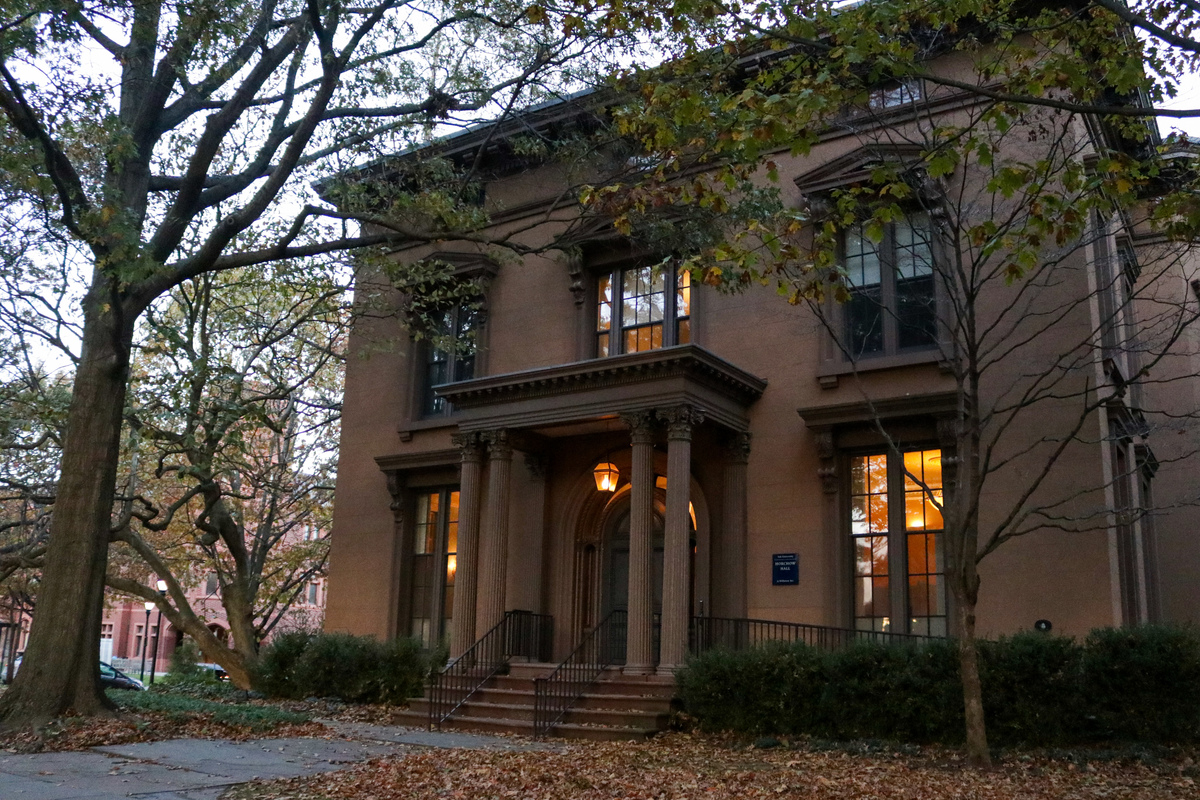Jackson launches five-year B.A.-B.S./M.P.P. program for undergraduates
Current Yale College juniors will be eligible to apply for Jackson’s five-year B.A.-B.S./M.P.P. program in the spring.

Kai Nip
Yale’s global studies school will launch a five-year program for undergraduates in the spring, allowing a select few to obtain a Masters in Public Policy in Global Affairs ahead of schedule.
The new B.A.-B.S./M.P.P. program fits squarely in the school’s commitment to global leadership and service, Lorenzo Caliendo, deputy dean of the new Jackson School of Global Affairs, said at an info session to prospective applicants.
Director of Undergraduate Studies for political science David Simon stressed that students will receive significant guidance from Jackson faculty to guide them through their coursework and summer experiences.
“How can we at Jackson help you become the person with a profile that you want to be?” Simon asked. “[The five-year B.A.-B.S./M.P.P. program is] a tremendous opportunity to be able to do that in just one year right out of your college.”
The program exposes undergraduate Yale College students to Jackson’s courses beginning their senior year. Requirements include taking classes in Jackson’s core curriculum, a language class up to L4 and a leadership and ethics workshop, along with an approved summer experience between their fourth and fifth year in the program.
To successfully complete the program, students are required to complete 36 college credits in pursuance of a B.A.-B.S. and 12 graduate-level credits for the M.P.P. For the required Yale College credits, 32 courses must be non-professional.
Simon noted the differences between traditional M.P.P. students and students enrolled in Jackson’s five-year program.
Whereas two-year M.P.P. students are expected to take 16 classes, roughly four credits per term, students enrolled in the new program fulfill 12 credits for the M.P.P. In their senior year at Yale College, the equivalent to their fourth year in the program, students are expected to take four of Jackson’s core credits.
The Jackson School stresses the importance of its intentionally small, tight-knit community, enrolling only 35 students. Admittance to this program is similarly small: an anticipated 3 to 5 undergraduates will be accepted this year, according to Jackson’s Assistant Dean of Graduate Admissions Asha Rangappa LAW ’00.
“We are a new school, and we are in a way bringing all our best resources and our best practices that we know from different schools to create leaders for global affairs,” Caliendo said.
Rangappa said that the school plans to have the special application portal for the program go live on Jan. 1, 2023 and close on Feb. 15, noting that it will require a personal statement about students’ focus area and interests, two letters of recommendation with at least one from a Yale course instructor, a resume and a letter of approval by the student’s residential college dean. Faculty involved in the application review process will recuse themselves from writing letters of recommendation for applicants to this program.
Applications will first be screened by the dean of admissions and assistant dean for undergraduate students at Jackson before a final review committee consisting of the deputy dean, assistant dean for graduate studies and a Jackson faculty member.
Although information about the review committee is public and was shared at the information session, Rangappa noted that it would not be communicated via the Jackson website. In an email to the News, Rangappa wrote that “prospective Yale applicants can reach out and ask about the admissions process, members of the faculty review board, etc.”
While Rangappa said that the program encourages applications from all majors and gives no preference for a particular background, she noted that a demonstrated interest in international relations and global affairs through an applicant’s academic, personal or professional experiences will be taken into account.
“Students interested in this program and who are earlier in their Yale education should take this into account in choosing courses and summer experiences leading up to their junior year,” Rangappa wrote in an email to the News.
Rangappa added that she expects the biggest challenge for the undergraduate students applying to the program will be a lack of work experience, noting that “[Jackson’s] regular applicant pool is coming in after having worked generally for two to five years.”
Eming Shyu ’25, a prospective applicant to the program, said that he looks forward to the opportunity of focusing solely in an area of study that he is particularly interested in.
“My specific interest [in the program is] … the practical application of macroeconomics,” Shyu said. “There’s [a] lot of practition-based macroecon classes that don’t interact with history or polisci, which are two disciplines that I am still interested in but not as much as macreconomics. So, the freedom to take classes means that I can laser-focus on my specific interest without being worried too much about fulfilling a matrix of studies.”
Despite his enthusiasm for the program, Shyu expressed confusion about some of its logistics, such as how many credits can be carried over from their undergraduate studies. In particular, he noted that the program only allows students to carry four credits from one semester of their senior year into their graduate studies to fulfill the program’s 12-credit requirement.
Accepted students will receive their financial award at the time of admission. According to Rangappa, the award will only apply to students’ fifth year when they are in residence at Jackson.
“We hope to offer the same level of aid to the 5-year program as we do to the ‘regular’ MPP cohort,” Rangappa wrote. “The current first and second year classes have their tuition fully covered through a Jackson tuition fellowship, outside funding, or a combination of both; we aspire to continue that trend.”
Decisions for admission to the program will be released on April 1, 2023.







